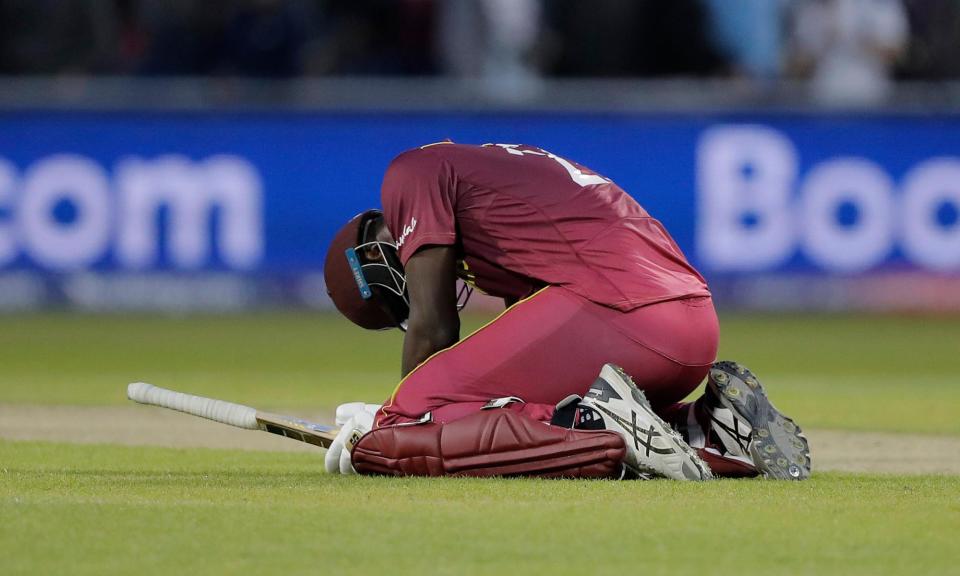In search of joy: West Indies cricket faces long rebuild after years of woe

“The typical West Indies fan is a jaded fan, a jaded, battered, worn fan, who is actually at the point of I would say searching for something that will bring joy and happiness from a cricket point of view,” says Daren Ganga, the former West Indies cricketer. “When the West Indies play, yes there is that sense of regional pride, there is that sense of spirit and willing a win, but their expectations have been tempered. Any sort of win is celebrated in great style, because it is a rare occasion.”
If England fans are feeling down in the dumps about their team’s recent white-ball travails, they should spare a thought for their next opponents, because the past few years have been ineffably grim for West Indies.
Related: Duckett eager to take his chance as England reset white-ball side
They finished ninth out of 10 teams at the 2019 World Cup, performed terribly at the 2021 T20 World Cup and even worse in 2022, and failed even to qualify for this year’s 50-over version. Of 14 Test series since England toured in 2019 they have won four, beating only the two teams below them in the ICC’s current rankings, Bangladesh (twice) and Zimbabwe, and England on their last visit, in 2022.
There are signs of recovery but also lingering discontent, and despite attempts by Cricket West Indies to repair relationships with senior players some remain strained. Central contracts are not particularly generous, leading some to disengage – last year Sunil Narine was left out of the World Cup squad, the lead selector, Desmond Haynes, explaining that “it seemed he was not interested”. “Gone are those days when you played for love. Love doesn’t buy you groceries,” said Darren Sammy, now the white-ball coach.
Last month Trinidad & Tobago were captained to victory in the Super50 Cup, West Indies’ domestic 50-over competition, by Darren Bravo, who was also the competition’s top scorer. When he was left out of the squad for the one-day international series against England that starts on Sunday his brother, the former West Indies captain Dwayne, posted a furious response on Instagram. “I usually stay away from these discussions, but the mistreatment, disrespect and dishonesty towards players over the years demand a voice,” he wrote. “When will this BS actually stop?” The post was liked nearly 100,000 times, including by a string of senior current and recent internationals.
Darren Bravo is 34, and though there is some inconsistency – Kjorn Ottley, who turns 34 next week and has played only two ODIs, is in the squad – is a victim of a tactical decision to focus on younger players. “The white-ball team is very much in transition,” says Ganga. “I don’t think it’s about trying to discard players who are over 30 but they’re giving more and more opportunities to players who’ve had limited chances.” Alick Athanaze, the top run-scorer at the 2018 Under-19 World Cup who has finally broken into the senior Test and ODI teams this year, is at the forefront of this new generation.
In 2020 an independent report into CWI’s finances found “a massive hole” in the organisation’s finances. Running the game across a disparate group of islands involves unique challenges, including flying players between fixtures and putting them up in the region’s unusually expensive hotels, not just for internationals but for all domestic competitions.
But the years since have brought a measure of financial stability, and next summer’s T20 World Cup, which West Indies will co-host with the USA, promises a further boost. Crucially India, who bring not just fans but the promise of lucrative broadcast deals, and England, with their army of travelling supporters, have toured the region in both 2022 and 2023, and the latter will return next November.
“The ECB’s business model is fundamentally based on support from their host broadcaster, Sky Sports. Outside of ICC distributions ours is based on England and India tours and by having both last year and again this year, we’ve pretty much been able to repair the balance sheet,” says Johnny Grave, the chief executive of CWI and formerly of Surrey and the Professional Cricketers’ Association. “The organisation’s financial woes were always a big burden, but after two very strong years we have very little debt, and we’re forecasting a good year with the T20 World Cup.”
CWI now owns the Coolidge Ground, a 20-acre site next to Antigua’s international airport, and last year established an academy and training facility there, offering players organised pathways into List A and first-class competitions. A women’s academy followed this year. The Caribbean Premier League, a Twenty20 franchise competition with all teams now under Indian ownership, is a continued success – Ganga describes it as “the umbilical chord that has connected the West Indies talent pool in T20 cricket to the international side”.
Next year’s World Cup is a chance both to fill the board’s coffers and to demonstrate the team’s renewal. “That’s our opportunity to show the world that this is still the best place to watch and play cricket, and the most fun,” says Grave. “Fans can enjoy the Caribbean welcome and the unique stadium atmosphere, and the cricket will be exciting and compelling. We’re focused on repairing the brand and giving our longsuffering fans something to shout about and cheer. We’ve beaten everyone in the world at T20 cricket in home conditions in recent years, and we want to win it.”

 Yahoo Sport
Yahoo Sport 






































